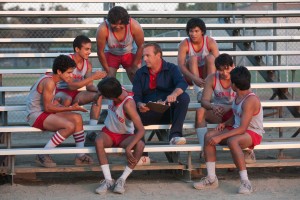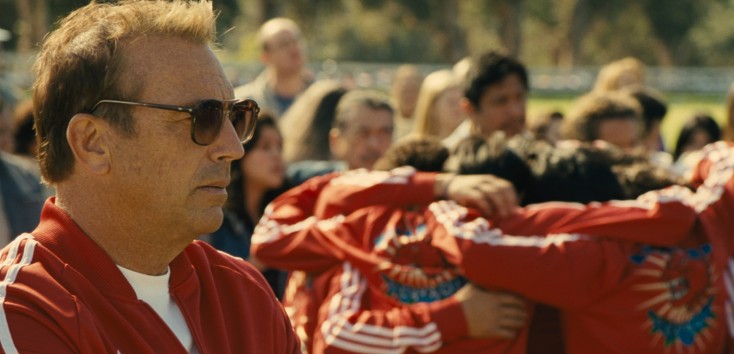
(l-r) Johnny Sameniego (Hector Duran), Victor Puentes (Sergio Avelar), Damacio Diaz (Michael Aguero), Danny Diaz (Ramiro Rodriguez), Coach Jim White (Kevin Costner), Jose Cardenas (Johnny Ortiz), Thomas Valles (Carlos Pratts) and David Diaz (Rafael Martinez) in MCFARLAND, USA. ©Disney Enterprises. CR: Ron Phillips.
By ANGELA DAWSON
Front Row Features
HOLLYWOOD—Kevin Costner has a confession to make about his new Disney film, “McFarland USA,” in which he plays the coach of a cross country team made up of poor migrant students, who initially don’t even own running shoes.
“I hate running,” the veteran actor/director reveals during a press conference to promote the movie.
Fortunately, for him and for moviegoers looking for something other than a two-hour experience of watching guys running for miles and miles to test their endurance, “McFarland USA,” is not about the sport so much as it about a group of individuals who overcame obstacles like poverty and low expectations through sheer grit and determination. Cross country is simply the backdrop to the story, which is based on real events.
Costner plays Jim White, a coach who moves with his family to this California central valley community to teach high school physical education to the children of Spanish-speaking migrant workers, and winds up forming a team of cross country runners, who become (spoiler alert) state champions.
In the film version, White is a man looking for redemption, after losing his job following a physical altercation with a student at another school. It’s also about the seven young men—three of them brothers—whom he shapes into athletes, inspiring and encouraging them to achieve their full potential. Like any good sports-themed movie, “McFarland USA” is about what you can achieve with talent, teamwork, commitment, determination, dedication and hope.
The two-time Oscar winner (“Dances with Wolves”) is no stranger to the genre (if there is a genre for feel-good sports-themed movies), having previously starred in two baseball-themed films “Field of Dreams” and “Bull Durham.” At 60, the still boyish-looking Costner has advanced to the coaching role. The California native says when he commits to a film, it has to be about something he believes in or it has to tell a story that moves him. “McFarland USA” fulfilled both of those requirements.
He first read about White and his team of underdogs in a “Sports Illustrated” article several years ago. When filmmaker Niki Caro (“Whale Rider,” “North Country”) approached him to star in the film alongside a cast of mostly young and inexperienced actors playing who played the team members, he was ready to go.[private]
Q: What appealed to you about playing Jim White?
Costner: I had lived in the Central Valley, in Visalia. I actually played McFarland in high school baseball. I was taken with the story I read in “Sports Illustrated.” After I read the article, I closed the magazine and moved on with my life. Then, this movie came up, and this shining cloud (director) Niki Caro said, “Would you be in this movie?” It’s so nice to be wanted. You might think I get everything I want; I don’t. To be wanted, and for that to match up, was really a nice thing for me. It was a beautiful thing, actually.
Q: How did you feel about playing a coach?
Costner: There are these men and women all over America who are affecting our young people. Relationships that coaches establish with young people is something that carries through their life if it’s done right. There’s not a lot of Jim Whites, but there are Jim Whites, and he represents the best of the best. It’s almost biblical. Our children have a hard time listening to their parents. There’s a moment in time where kids really don’t want to hear anything from their parents, but a coach can take on that thing, and boy, if they are of the cloth that Jim White came from—a very graceful, very quiet man—who somehow let them know what was possible (then they are very lucky).
Jim White, in just kind of putting the goal out in front of them, look what happened: champions. They exceeded beyond their expectations, so it’s a great lesson to us, McFarland. If we give our children goals, and we let them see what’s possible, they can exceed beyond their own wildest expectations. It’s just a very good lesson, this movie. I was proud to play the essence of Jim White (but) I’m not Jim White—we’d all like to be Jim White in some way—but it was a pleasure to be able to do that (on film).
Q: How was it working with director Niki Caro? What do you think of her directing style?
Costner: Niki completely immersed herself in this (migrant) culture. It’s a style that Niki has, in which is she trusts the people that she’s going to film. She hired local actors like Sergio (Avelar, who plays runner Victor Puentes, in his first film role). Even though that doesn’t get translated in their conversation, it’s not lost on anybody that she trusts the members of this community to be able to work in the movie, and to be great. That’s the kind of thing that gets unspoken. But in a way, it’s the DNA of how she works.
She is very willing to go with someone who grew up on those streets, who had his own dreams, and then to make that phone call (and offer him the part). That phone call changes lives. There’s a hundred hearts that broke, and there’s like eight hearts whose lives get a chance to change because of the phone call that Niki makes. It’s also about the trust that she has and the words she heard spoken back to her. Niki was really our leader. I was a player on the court for her. She’s like a piece of steel. She is gentle but she’s going to get her movie and she protects her cast and her story. It’s really nice to see that. With Niki, there’s no committee. She’s our boss.
Q: Since you played sports in your youth, did you have a Jim White-like coach in your life? Can you talk about that experience?
Costner: Yeah, I’ve had two coaches (like him). One was from Visalia. His name was Jim Barnett. He was a baseball coach. He was a real help to me in a lot of ways. There was a man that was very powerful. His name is Joe Vaughn. He’s the winningest basketball coach in the state of California for girls’ basketball. I was on the last team where he coached the boys. Maybe he was sick of us. (He chuckles.)
I started to get in a little bit of trouble in high school. He just took me off to the side, and he said, “I thought you were a Jesus, man.” I just looked at him and I just started crying. This guy that I really respected, I felt like I had disappointed him. I kind of got my act together after that.
I was always listening to my father more than anyone. I was always afraid of my father more than anyone, but there’s a moment in time where other men in your life can have a huge impact. Joe Vaughn did.
Nowadays, you almost don’t know what to say to kids because you could be dragged into court. But here’s somebody that took me around the corner and said, “Look, I think you can be better than who you’re hanging out with.” I remember tearing up and going, “I think I can, too. Does this mean I still get to start on the team?” And he goes, “Yes, you can.”
Q: You’ve done these sports movies, westerns and contemporary films. Is there a character or type of film that you have not done yet that you want to do?
Costner: I’ve been able to do a lot of things in the movies. I’ve been able to run with the buffalo. I’ve been able to pitch a perfect game in Yankee Stadium. I’ve gotten into a bathtub with Susan Sarandon (in “Bull Durham”). I’ve had a lot of chances to do a lot of things. I enjoy sports, but I enjoy sports so much to the point that I wouldn’t do a movie unless I thought it had a chance to be good. That’s how much I like them. I’m not dying to do a sports movie and have it just look average.
So no, there’s nothing that I covet out there. I wait for something to come along that really is a clear sound that I can respond to, and that I can just really move to it. I’m not looking for the next sports movie at all, by any stretch. I did two sports movies back to back—“Field of Dreams” and “Bull Durham”—and no one thought that was a smart idea. But those movies separated themselves so much. If I plan my life so much in advance, I’ll miss this. I would have missed “McFarland USA” by getting in my mind what I’m going to do in my life. We all have to have our north star we kind of fix on and we go to, but life is so much about the things that bump into you. It was really happy how this happened.
Q: What it is about a sports movie that allows us to address other issues like prejudice and expectations, and especially here with “McFarland USA?”
Costner: If you want to make a great sports movie, don’t put too much sports in it. It’s the backdrop. It’s the environment. “Bull Durham” was about men and women, why they can and can’t get along and have to still be together. Niki figured this out. Yes, the running had to be authentic and the boys had to work hard. They didn’t have all the facilities that the other teams had.
The idea of going to that last meet, where these guys had been building themselves up, and they look up and they see these big buses with these big schools and these (opposing teams with players in) really nice uniforms, and they start to shrink, they start to pull back. We weren’t going to let them fall back. We were going to have them look these other boys in the eye and know that they’re just as good, and in my mind, they’re better. That’s what the movie is about—you’re just as good, and if you work harder, you can be better. You can be more than you think you can.[/private]




